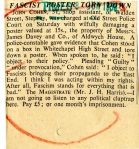 This book newly published in English by Merlin looks really interesting:
This book newly published in English by Merlin looks really interesting:
Social-Democracy and Anarchism in the International Workers’ Association, 1864-1877
by Rene Berthier
This book explores the conflicts that took place in the First International. Social and economic conditions varied greatly in Europe in the 1860s and 1870s. The strategies adopted by the various federations and sections of the International Workers’ Association, or IWA, reflected this diversity.
Although Marx and Engels have been seen as the leaders of the International, there were many who rejected their leadership. In September 1872 an extraordinary congress took place in Saint-Imier (Switzerland) which rejected the decisions taken at The Hague congress by Marx and his friends. A year later six IWA federations met in a regular congress in Geneva and reasserted the principle that political organising should be subordinate to workplace – economic – organisation. The great aim of the IWA was for working people to liberate themselves.
The ongoing IWA disregarded edicts of expulsion issued by the New York based General Council, at the instigation of Marx and Engels. The latter discovered they were generals without an army, isolated and at odds with the bulk of the organised labour movement.
René Berthier reviews the historiography of this conflict. Much of the ongoing IWA were inspired by Bakunin. He argued for the priority of labour solidarity. But it was not an anarchist International that was created in 1872. Anarchism was born some five years later, when Bakunin was dead. Rather, the adoption of anarchism by the remnants of the IWA marked a breach with Bakuninism.
There’s an interesting review by Dave Douglass in the Weekly Worker.
Will it be possible for those for whom Marx’s word reads like a gospel to be able to accept that, perceptive genius aside, Marx was a bureaucratic, manipulative, tendency bully and not at all a team player? Any one of us with lifetimes in the revolutionary workers’ movement will surely find such a discovery not so surprising at all; maybe they actually did not do it any better then than we do now.
…it is clear from the evidence in this book [that Marx in his First International period] foresaw something like mass social democratic parties occupying seats of office in national parliaments… Bakunin, on the other hand, like the subsequent Industrial Workers of the World, saw the need for mass industrial struggles at the heart of the productive process and centre of wage-slavery, as the workers’ industrial unions and trades societies were constructed to fight it. He thought that the struggles at work, the tasks of solidarity, the growth of class-consciousness and construction of workers’ industrial combat organisations were the way to fight capitalism in the here and now and the framework of an alternative social system of administration of wealth and power at the other end.
[Via Arieh]
 Workers Unite! The International Working Men’s Association 150 Years Later. Edited by Marcello Musto. Bloomsbury. 2014.
Workers Unite! The International Working Men’s Association 150 Years Later. Edited by Marcello Musto. Bloomsbury. 2014.










 The past in the present: After last week’s
The past in the present: After last week’s 





 From the archive of struggle
From the archive of struggle








